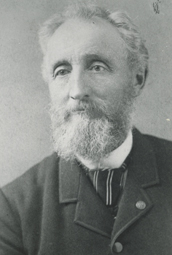Leander A. Poor was born in Vienna, Maine on June 10, 1833, the oldest child of Jonathan D. and Caroline Porter Poor. He was a graduate of Bowdoin College and, in 1859, was principal at the high school in North Oxford, Massachusetts. At the outset of the Civil War, he joined Company C, U. S. Engineers Battalion at Worcester, Massachusetts but was subsequently discharged due to a medical disability he contracted while serving in Virginia.

In 1864 Poor was commissioned a captain in the United States Volunteers and assigned to the Union Army's First Division, Fourth Army Corps. At the end of the war, the Fourth Corps was ordered to Texas to reestablish federal jurisdiction in the state. Captain Poor was in Texas from September 1865 to June 1866 and was stationed at Indianola and later Port Lavaca to oversee the rebuilding of the the San Antonio and Mexican Gulf Railway, that ran from Port Lavaca to Victoria, and the Indianola Railroad that connected from Indianola to Port Lavaca.
Poor corresponded with his future wife, Mary Dore, in Maine and kept a daily journal of his time spent in Texas, describing the landscape and living conditions as well as commenting on his work regarding the San Antonio and Mexican Gulf Railway—information of particular interest to researchers tracing the history of the railroad.
In 1866, Poor returned to Maine and was brevetted a major, and honorably discharged from military service. He worked as a school teacher and administrator and was later elected to the Maine legislature as a State Senator from Cumberland County.
Contents of the Poor Papers: Poor Daily Journal January 1—June 21, 1866; Correspondence, 1865-1866. (All are facsimile copies and transcriptions.)
References
Spurlin, Charles D. (2003) Capt. Leander A. Poor, U. S. V., in Port Lavaca, 1865-1866. The Journal of South Texas, 16, 169-194.